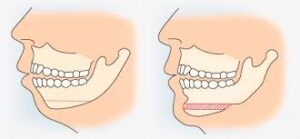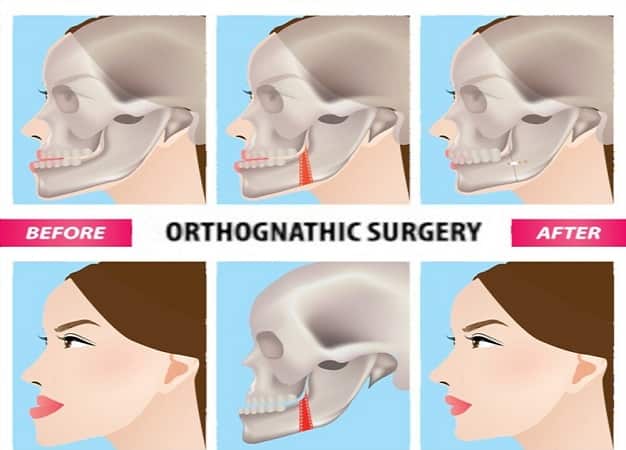Corrective Jaw Surgery in Pittsburgh PA
Corrective Jaw Surgery in Pittsburgh PA
Corrective jaw, or orthognathic, surgery is performed by Oral and Maxillofacial Surgeons to correct a wide range of minor and major skeletal and dental irregularities, including the misalignment of jaws and teeth, which, in turn, can improve chewing, speaking and breathing. While the patient’s appearance may be dramatically enhanced as a result of their surgery, orthognathic surgery is performed to correct functional problems.
WHAT IS CORRECTIVE JAW SURGERY?
Corrective jaw surgery, medically referred to as orthognathic surgery, serves to rectify irregularities within the jaw bones, promoting the realignment of both jaws and teeth to enhance functional and aesthetic aspects. This surgical intervention becomes a viable option when orthodontics alone proves insufficient in addressing persistent jaw issues. Typically, the comprehensive treatment plan involves the strategic collaboration between an orthodontist and an oral and maxillofacial surgeon.
In preparation for corrective jaw surgery, orthodontic braces are often prescribed before and after the surgical procedure. This phased approach ensures optimal dental alignment and facilitates proper healing. The suitability of corrective jaw surgery is most pronounced post the cessation of growth, generally occurring around ages 14 to 16 for females and ages 17 to 21 for males.
For individuals seeking corrective jaw surgery in the Pittsburgh area, consultations with specialized professionals are essential. Understanding the nuances of what corrective jaw surgery entails, particularly in the context of Pittsburgh, enables prospective patients to make informed decisions about their oral health and overall well-being.
WHEN DO YOU NEED CORRECTIVE JAW SURGERY?
Individuals in Pittsburgh seeking solutions for improper bites or misaligned jaws may find significant benefits in orthognathic surgery, commonly known as corrective jaw surgery. The gradual process of jaw growth may sometimes result in upper and lower jaws not aligning correctly by the end of growth, leading to issues with chewing function, speech, long-term oral health, and overall appearance.
In cases where bite problems involve only the teeth, orthodontics alone can often provide a solution. However, if the underlying cause lies in the misalignment of the jaw bones (maxilla and mandible), considering corrective jaw surgery becomes crucial.
Attempting to address mismatched jaws solely by moving the teeth can give rise to various complications, including periodontal issues, relapse of orthodontic movements, jaw joint problems, and undesirable facial aesthetics. For those in the Pittsburgh area facing such challenges, exploring the option of corrective jaw surgery can offer comprehensive solutions and contribute to optimal oral health and facial harmony.

FIX YOUR JAW WITH CORRECTIVE JAW SURGERY
If you are looking to have jaw surgery, our team at Kail and Moore oral surgery will help you take the proper steps to get you, feeling like you, again.
Mount Lebanon Jaw Surgery
Robinson Jaw Surgery

If a patient’s upper and lower jaws and teeth lack proper alignment or there is insufficient space for the teeth, corrective jaw surgery often becomes the recommended solution. Orthognathic surgery, addressing misaligned jaws, is performed on the jawbone to enhance both function and facial aesthetics. Post-surgery, many patients require orthodontic care to reposition the teeth, resulting in improved function and a more balanced facial appearance.
For specific jaw corrections, various procedures are employed:
Maxillary Osteotomy:
- Correction of open bite, crossbite, or a receding jawline.
- An incision is made in the upper jaw, and small sections are precisely moved into alignment.
- Stabilization is achieved using plates and screws.
Mandibular Osteotomy:
- Common for protruding or receding lower jawbone.
- An incision is made behind the teeth, and the jawbone is shifted and secured with titanium screws and plates.
Genioplasty:
- Corrective chin surgery often performed with mandibular osteotomy.
- Involves cutting and repositioning the chin bone, addressing issues like a receding or prominent chin.
Jaw Surgery for TMJ:
- Reserved for severe temporomandibular joint disorder cases after other treatments fail.
- Drs. Kail and Moore undertake this surgery when the jaw cannot open or close without assistance.
Acknowledging the complexity of jaw surgery and its demanding recovery, the oral surgeon collaborates closely with dentists, orthodontists, and specialists. This ensures seamless integration with ongoing or future treatments, emphasizing patient well-being throughout the process.
If you are experiencing pain, you should meet with your dentist or oral surgeon to consider wisdom teeth removal to avoid further complications.
Typically, the younger you are when getting wisdom teeth surgery, the less pain you will experience.
Pain free DOES NOT equal disease or problem free! Speak with your dentist if you ahve not had your wisdom teeth removed.
Corrective jaw surgery, or orthognathic surgery, may be recommended when encountering various conditions that impede optimal oral function and facial aesthetics. This procedure addresses concerns such as:
Enhancing Chewing Function: Jaw surgery can make biting and chewing easier, improving overall chewing efficiency.
Swallowing and Speech Correction: It proves beneficial in correcting issues related to swallowing and speech, contributing to improved oral communication.
Preventing Tooth Wear: The surgery minimizes excessive wear and breakdown of teeth, ensuring dental longevity.
Addressing Bite and Jaw Closure Problems: Conditions like an open bite, where molars touch but front teeth don’t, are corrected, promoting a balanced bite and jaw closure.
Correcting Facial Imbalance: Jaw surgery is effective in addressing facial asymmetry, including concerns such as small chins, underbites, overbites, and crossbites.
Optimizing Lip Closure: It enhances the ability of the lips to fully and comfortably close, contributing to facial harmony.
Alleviating Pain: Corrective jaw surgery provides relief from pain associated with temporomandibular joint (TMJ) disorders and other jaw-related discomforts.
Addressing Sleep Apnea: For those suffering from obstructive sleep apnea, jaw surgery can offer relief by addressing contributing factors.
Facial Injury and Birth Defects: Additionally, the procedure is indicated for the repair of facial injuries or addressing congenital birth defects.
WHY SHOULD YOU GET CORRECTIVE JAW SURGERY
CORRECTIVE JAW SURGERY PROCEDURE
Prospective patients often inquire about potential discomfort associated with corrective jaw surgery, the duration of the procedure, and whether jaw surgery causes pain.
Typically, corrective jaw surgery is performed intraorally, minimizing visible facial scars on the chin, jaw, or around the mouth. However, in some instances, small incisions outside the mouth may be necessary.
The surgical process involves precise cuts in the jawbones, repositioning them for optimal alignment. Following jaw movement, the surgeon may employ tiny bone plates, screws, wires, and rubber bands to secure the bones in their new position. These screws, smaller than braces brackets, integrate into the bone structure over time.
In certain cases, additional bone may be required. Surgeons may transfer bone from the hip, leg, or rib, securing it with plates and screws. Alternatively, bone reshaping may occur for a better fit.
Corrective jaw surgery may encompass the upper jaw, lower jaw, chin, or a combination of these areas. As patients explore the potential of corrective jaw surgery, it’s crucial to address concerns about pain, the duration of the procedure, and the recovery process. Consulting with a qualified oral surgeon can provide personalized insights and alleviate any apprehensions about the surgical experience.
How do you prepare for jaw surgery? Our pre-operation checklist will help to reduce pain and discomfort from the surgery.
Did you have corrective jaw surgery in Pittsburgh? Our post-operation checklist will help mitigate any potential problems and reduce discomfort.
Are you in pain from a recent jaw surgery procedure? Our team has prepared a list of commonly asked questions to help jaw surgery recovery.
Our team is dedicated to providing quality oral surgery procedures for those living in the Pittsburgh Pennsylvania and surrounding areas. If you want to scheduel a procedure, understand the cost, or have any other questions, please contact our teams located in Mount Lebanon or Robinson and a representative will take care of all your needs.
 Donna Snyder2023-10-05Caring, compassionate professionals. I had two molars extracted and had absolutely no swelling and very little discomfort after the surgery. Once I am healed, I am going back for two implants. Don't hesitate to go to this office. I recommend them highly!
Donna Snyder2023-10-05Caring, compassionate professionals. I had two molars extracted and had absolutely no swelling and very little discomfort after the surgery. Once I am healed, I am going back for two implants. Don't hesitate to go to this office. I recommend them highly! Charlene Lariosa2022-07-28It’s been a year since Dr. Kail took my wisdom teeth out and I have nothing to complain about. The before and after process went super smooth. The surgery went excellent, and the he prescribed me really great pain killers so I was not in pain after surgery. The price was really great and I would definitely recommend to visit Dr. Kail for wisdom teeth extraction.
Charlene Lariosa2022-07-28It’s been a year since Dr. Kail took my wisdom teeth out and I have nothing to complain about. The before and after process went super smooth. The surgery went excellent, and the he prescribed me really great pain killers so I was not in pain after surgery. The price was really great and I would definitely recommend to visit Dr. Kail for wisdom teeth extraction. Teresa Monier2021-09-12Best oral surgeon in the universe- excellent surgeon and bedside manner is outstanding- excellent and caring staff !!!!
Teresa Monier2021-09-12Best oral surgeon in the universe- excellent surgeon and bedside manner is outstanding- excellent and caring staff !!!! Sam2020-06-15Great place, nice staff! My anxiety was through the roof because of my tooth extraction. He eased my mind about it and it took all of 10 minutes if that. They numbed me, I sat for 10 minutes then he extracted it. In and out. I definitely recommend Dr. Michael Kail!
Sam2020-06-15Great place, nice staff! My anxiety was through the roof because of my tooth extraction. He eased my mind about it and it took all of 10 minutes if that. They numbed me, I sat for 10 minutes then he extracted it. In and out. I definitely recommend Dr. Michael Kail!
JAW SURGERY RECOVERY
Patients typically resume work or school one to three weeks post-surgery, depending on their recovery progress. For minor procedures, the usual recovery lasts a couple of weeks, while more complex surgeries may require six to eight weeks for the initial healing phase. Complete healing of the jaws spans nine to twelve months. Bruising usually subsides within a few days, while swelling diminishes over two to three weeks.
Individuals might be more conscious of their appearance than others perceive, and experiencing fatigue in the afternoon is common but improves with time. Various factors, including age, influence the timeline for returning to normal activities. A positive attitude significantly contributes to the recovery process, and maintaining a healthy diet aids in quicker recuperation.
Dr. Maranon prioritizes patient comfort during the post-operative course. While some pain is anticipated, the goal is to manage it with soreness rather than severe discomfort. Prescription pain medication is often only required for a few days, with over-the-counter options sufficient thereafter. Engaging in conversations, despite potential soreness, promotes muscle exercise and accelerates recovery. Surgical procedure type, duration, and individual factors, such as school or work demands, also impact the recovery timeline.
WHY CHOOSE KAIL AND MOORE FOR CORRECTIVE JAW SURGERY IN PITTSBURGH
Our team is dedicated to providing you with quality service and comforting care from the first phone call till your last check-up. Both Dr. Kail and Moore serve as adjunct clinical professors at the University of Pittsburgh and are on staff at UPMC hospitals; they are dedicated to staying on-top-of advancing education in the fields of oral and maxillofacial surgery. With over +20 years of combined practicing experience, Kail and Moore aim to provide the city of Pittsburgh top corrective jaw surgery solutions, service, and care.


